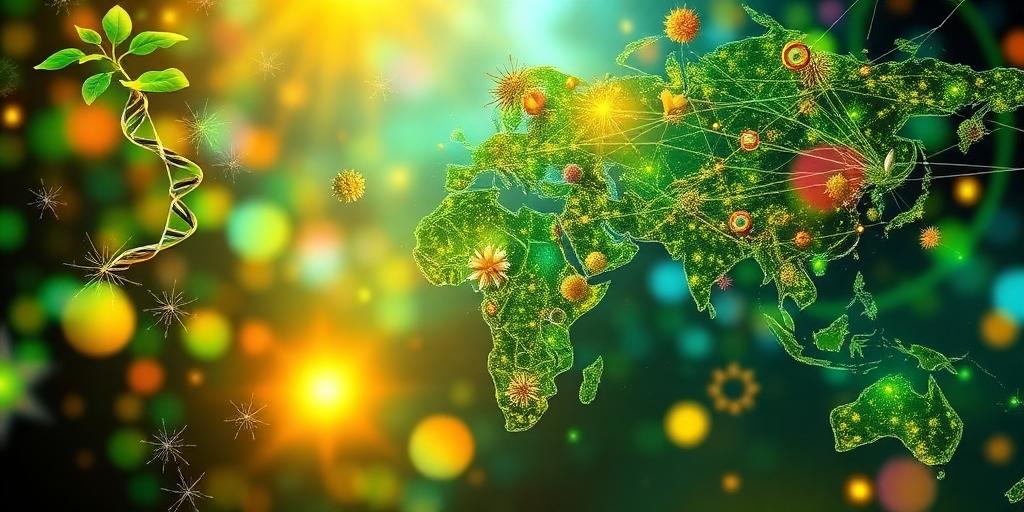The Bio-Economy: Opportunities for India and the World in 2025
The bio-economy, encompassing economic activities related to the invention, development, production, and use of biological products and processes, is poised to reshape industries and economies globally. By 2025, the bio-economy presents significant opportunities for both India and the world, driven by technological advancements, sustainable practices, and growing demand for bio-based products. This article explores the potential impacts and prospects of the bio-economy in the coming years.
Understanding the Bio-Economy
The bio-economy involves several key sectors, including:
- Agriculture: Sustainable farming practices, biofuels, and bio-based fertilizers.
- Healthcare: Biopharmaceuticals, personalized medicine, and diagnostics.
- Industry: Bioplastics, bio-based chemicals, and enzymes.
- Environment: Bioremediation, waste management, and renewable energy.
By leveraging biotechnology, countries can enhance resource efficiency, reduce reliance on fossil fuels, and foster innovation across multiple sectors.
Global Opportunities in the Bio-Economy by 2025
-
Sustainable Agriculture:
- Precision Farming: Utilizing data analytics and IoT to optimize crop yields while minimizing environmental impact.
- Bio-based Inputs: Adoption of biofertilizers and biopesticides to promote soil health and reduce chemical usage.
-
Healthcare Innovations:
- Biopharmaceuticals: Development of novel therapies and vaccines using biotechnology.
- Personalized Medicine: Tailoring medical treatments to individual genetic profiles for better outcomes.
-
Industrial Biotechnology:
- Bioplastics: Production of biodegradable plastics from renewable resources to combat plastic pollution.
- Bio-based Chemicals: Substituting petroleum-based chemicals with bio-based alternatives for various industrial applications.
-
Environmental Solutions:
- Bioremediation: Using biological agents to clean up pollutants in soil and water.
- Bioenergy: Generating renewable energy from biomass and waste materials.
Opportunities for India in the Bio-Economy
India, with its vast agricultural resources and growing biotech industry, is uniquely positioned to capitalize on the bio-economy. Key opportunities include:
-
Agricultural Transformation:
- Increasing Crop Productivity: Implementing biotechnological solutions to improve crop yields and resilience.
- Supporting Bio-based Startups: Fostering innovation through funding and infrastructure for agricultural biotech startups.
-
Healthcare Advancements:
- Developing Affordable Biopharmaceuticals: Creating cost-effective biosimilars and novel biologics for domestic and international markets.
- Enhancing Diagnostic Capabilities: Utilizing biotechnology to develop rapid and accurate diagnostic tools for various diseases.
-
Industrial Growth:
- Promoting Biomanufacturing: Encouraging the production of bio-based chemicals and materials to reduce import dependence.
- Creating a Bio-based Economy Ecosystem: Establishing policies and incentives to support the growth of bio-based industries.
-
Environmental Sustainability:
- Implementing Waste-to-Energy Projects: Converting agricultural and municipal waste into biogas and other renewable energy sources.
- Promoting Bioremediation Technologies: Deploying biological solutions to address pollution challenges in water bodies and industrial sites.
Challenges and Mitigation Strategies
Despite the immense potential, several challenges need to be addressed to realize the full benefits of the bio-economy:
- Regulatory Hurdles: Streamlining regulatory processes to facilitate the approval and commercialization of bio-based products.
- Investment Gaps: Attracting public and private investment in bio-economy research and development.
- Skills Shortages: Developing a skilled workforce through education and training programs.
- Public Awareness: Raising awareness about the benefits and safety of bio-based products.
Conclusion
The bio-economy represents a transformative opportunity for both India and the world. By 2025, advancements in biotechnology, sustainable practices, and supportive policies can drive significant economic growth, environmental sustainability, and societal well-being. India, with its strategic advantages, can emerge as a key player in the global bio-economy by focusing on agricultural transformation, healthcare innovation, industrial growth, and environmental sustainability. Embracing the bio-economy will not only enhance economic competitiveness but also contribute to a more sustainable and resilient future.
